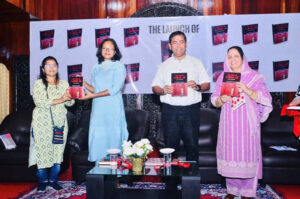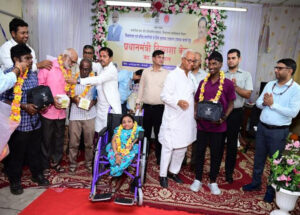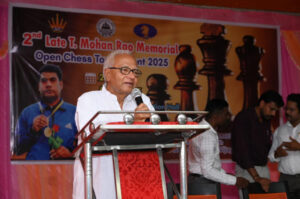
Neeraj Kujur & Vikramaditya
Sri Vijaya Puram, May 28: In a powerful homage to the forgotten stories of India’s freedom struggle, a new book titled “The Story of Cellular Jail – Prison to Pilgrimage” authored by eminent historian, writer, and cultural scholar Dr. Rashida Iqbal, was officially released at a special function held at the historic Andaman Club in Sri Vijaya Puram today. The event was graced by the Chief Secretary of Andaman and Nicobar Administration, Mr. Chandra Bhushan Kumar, who was the Chief Guest of the event.
Dr. Rashid Iqbal, is a poet, writer and a well-known speaker from isles and former Assistant Director ( Art& Culture).
The ceremony was also attended by the Secretary of Art and Culture, Ms. Jyoti Kumari, IAS, Director of Art and Culture, Ms. Priyanka Kumari, prominent historians from the islands, key stakeholders from the tourism sector, well-wishers, family members of the author and members of the general public.
The book, which dives deep into the layered history of Cellular Jail and the turbulent journey of India’s struggle for independence in the Andaman Islands, was lauded by the Chief Secretary for its rigorous research and powerful storytelling. “This work doesn’t just highlight the architectural and political history of Cellular Jail, but presents a rich account of the values, sacrifices, and the resilience of our freedom fighters,” the Chief Secretary said while addressing the gathering.
He emphasized the critical importance of connecting today’s youth with their past. “A society that does not understand its history cannot shape its future. This book ensures that future generations will not forget the sacrifices made on these islands,” he added. Referring to the Prime Minister’s Panch Pran (Five Pledges) vision, he stressed the need to take pride in India’s heritage and preserve stories of both glory and pain for posterity.
He further stated the Andaman and Nicobar Islands offer immense opportunities for writers, researchers and storytellers. From tribal traditions to tales of freedom fighters, these islands are rich with stories that deserve to be told, said the Chief Secretary adding that many of the values held by our fore-bearers are timeless and rooted in indian philosophies. Every time we hear these stories, they inspire us and leave a lasting impact. In the context of Cellular Jail, understanding that journey is crucial not only for us but for the generations to come, the Chief Secretary stated stressing that we must share this knowledge with everyone, including visitors from across the country, so they too can appreciate the historical significance of these sacred sites. He also informed that the Cellular Jail and Narcondam Island are currently on UNESCO’s World Heritage Sites tentative list, and work is ongoing to ensure its inclusion in the final list . The Administration has also proposed four more additional sites from these islands for World Heritage recognition, each representing a unique aspect of the islands’ heritage, the Chief Secretary informed.
Dr. Rashida Iqbal, a veteran educator and cultural custodian who has spent over three decades with the Department of Art and Culture, spoke about the motivation behind her book. “This is a compact yet comprehensive account from 1858 to 1945, covering the establishment of the penal colony, the construction of the Cellular Jail, the sufferings of freedom fighters, and the later Japanese occupation of the islands,” she said.
The book also sheds light on what transpired with the Jail after India’s independence—how large parts were lost, what was saved, and how the structure was ultimately preserved and elevated to a National Monument. Dr. Iqbal gives special credit to the Ex-Andaman Political Prisoners Fraternity Circle for their tireless advocacy in safeguarding the Jail’s heritage.
An especially noteworthy element of the book is its final chapter, which provides detailed insights into the “Surviving History of the Cellular Jail”. This includes vivid descriptions of the prison’s transformation from a colonial site of suffering into a national symbol of reverence and learning. Dr. Iqbal also emphasized the role of visitors who come from across the country to pay homage and learn about the Jail’s history through its exhibitions and preserved cells.
In her remarks, Dr. Iqbal shared that the book is available in two editions – a paperback priced at Rs.349 and a hardbound edition for Rs.519 – both listed on Amazon and the website of the publisher, Notion Press.




